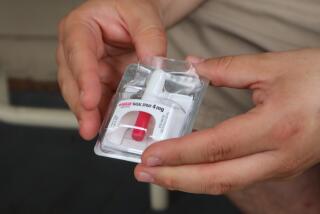No Need for Separate Testing : Safety of French Abortion Pill Already Established
- Share via
The proposal for separate California testing of RU 486, the abortion pill developed in France, misses the point.
There already has been extensive testing in the state by the USC School of Medicine under federal regulation. International clinical trials also have supported the efficacy and safety of the drug. Its introduction in the United States is being delayed not by problems of regulation but by the absence of an application by the manufacturer or a qualified supplier.
Atty. Gen. John K. Van de Kamp, in making the proposal for state tests in conjunction with his campaign for governor, asked that state funds now earmarked for testing AIDS-related drugs be used. That seems both unnecessary and unwise. It is not needed, because there have already been controlled tests. It is unwise because it would divert limited resources from more urgently required tests.
California is the only state that exercises its authority to approve drugs separately from the procedures of the Food and Drug Administration. This has been a practice for 50 years--although narrowly applied, usually to test secondary uses of drugs already approved by the FDA. The program was broadened in 1987 when the Legislature provided funds to test drugs made within the state that are potentially useful in controlling the human immunodeficiency virus (HIV) that causes AIDS. Three drugs are now being tested.
The FDA has handled its responsibilities for new drugs in an impressive fashion and there is no reason for California to sponsor separate approval mechanisms.
We regret that the distribution of RU 486 has been restricted to the nation of origin, France. We applaud the work done by the Population Council and USC in the California trials. They demonstrated the safety of the drug and its relative efficacy even when used alone and without the preferred combination with prostaglandins. But making RU 486 a political issue will not accelerate the introduction of this remarkable discovery to the American market.
The need now is to find sponsors who will press forward with requests to the FDA for marketing approval. The FDA demonstrated its efficiency with its recent quick response to new findings about the usefulness of AZT in early intervention with those infected with HIV. But it cannot act without a formal request.
More to Read
Sign up for Essential California
The most important California stories and recommendations in your inbox every morning.
You may occasionally receive promotional content from the Los Angeles Times.













